#Three Resurrected Drunkards
Explore tagged Tumblr posts
Text
Zainichi, which literally means “residing in Japan”, is the name given to ethnic Koreans who immigrated to Japan post-war.

Although Koreans in Japan prior to World War II suffered racial discrimination and economic exploitation, the Japanese authorities nonetheless counted ethnic Koreans as Japanese nationals and sought to fully assimilate Koreans into Japanese society through Japanese education and the promotion of intermarriage. Following the war, however, the Japanese government defined ethnic Koreans as foreigners, no longer recognizing them as Japanese nationals. The use of the term Zainichi, or "residing in Japan" reflected the overall expectation that Koreans were living in Japan on a temporary basis and would soon return to Korea. By December 1945, Koreans lost their voting rights. In 1947, the Alien Registration Law consigned ethnic Koreans to alien status. The 1950 Nationality Law stripped Zainichi children with Japanese mothers of their Japanese nationality; only children with Japanese fathers would be allowed to keep their Japanese citizenship.

Read more about Koreans in Japan:
#zainichi#korean#Japanese#japan#korea#post war Japan#discrimination#ethnic minority#immigration#immigrants#WWII#three resurrected drunkards#japanese film
21 notes
·
View notes
Text


Three Resurrected Drunkards
#three resurrected drunkards#nagisa oshima#film#cinema#criterion collection#japanese cinema#60s cinema
2 notes
·
View notes
Photo

Kazuhiko Kato, Osamu Kitayama, and Norihiko Hashida in Three Resurrected Drunkards (Nagisa Oshima, 1968) Cast: Kazuhiko Kato, Osamu Kitayama, Norihiko Hashida, Kei Sato, Cha Dei-dang, Fumio Watanabe, Mako Midori. Screenplay: Masao Adachi, Mamoru Sasaki, Tsutomu Tamura, Nagisa Oshima. Cinematography: Yasuhiro Yoshioka. Film editing: Keiichi Uraoka. Music: Hikaru Hayashi. Nagisa Oshima's attempts to unsettle his audiences usually took the form of serious explorations of social dysfunction like Cruel Story of Youth (1960), Boy (1969), and The Ceremony (1971) or sexually provocative films like In the Realm of the Senses (1976), but Three Resurrected Drunkards plays more like A Hard Day's Night (Richard Lester, 1964) than any of those often grim and brutal excursions into the dark side of contemporary Japanese life. It begins with three young men larking about at the beach, accompanied by a giddy Japanese pop song. When their clothes are stolen and replaced with others, the film goes off into a series of mostly comic mishaps. But there's a dark side to their larking about from the beginning: One of their gags is an attempt to restage the Pulitzer Prize-winning photograph by Eddie Adams of a South Vietnam general pointing a gun at the head of a grimacing Viet Cong prisoner. They take turns playing the general and the victim as the third critiques the grimace on the face of the one playing the victim. It turns out that the clothes thieves are South Koreans who are trying to sneak into Japan to avoid military service in Vietnam. The Koreans have a gun, with which they threaten the three young Japanese. Along the way, they also get involved with a young woman and an abusive older man who may or may not be her husband. At one point, the film simply stops and starts over at the beginning, but this time the characters know what happened in the first part and are able to change things around. It's all a fascinating blend of rock movie high jinks and serious social commentary: Oshima is satirizing the Japanese prejudice against Koreans, among other things. Some of the satire is lost on contemporary audiences, especially in the West, but Three Resurrected Drunkards is a fascinating glimpse into its director's imagination and political indignation.
3 notes
·
View notes
Text
oshima good oshima good
1 note
·
View note
Text
The fantasy in modern Arthuriana (3)
A follow-up of the previous post.

If the medieval Arthurian literature accumulates the tales of the feats of the heroes, the detail of their thoughts is mostly left in the shadows. Like the prose of Malory says for a good number of knights, “He said but little”, “He seyde but lytyll”. In other words, the Arthurian romance of the Middle-Ages is concerned with actions, not words. It is even truer when it comes to the female characters, a minority among the Arthurian adventures, and who are limited to a specific set of roles: queen and giver of goods (Guinevere), virgin and emissary of adventure (Linette), sad and dying lover (the lady of Escalot)… Such a restriction of functions invited in itself a fleshing out of the characters, not to say a remake. It is even stronger when we come to the sorceresses, another type of women largely used by modern rewrites, probably because they are precisely among the female characters the only one who, in the Middle-Ages, can freely participate to the action. [It is true that the maidens who guide the knights throughout their quests seem to also have an important area of action, but very often it is suggested that they belong to the supernatural world. In the Morte Darthur, the three ladies met by Gawain, Yvain and Marhalt embody the three ages of woman; Linette, who guides Gareth and helps him in his love, is able to “piece back together” and resurrect a dead knight].
If the revisited Arthurian literature likes to give a voice to women, these characters so often overshadowed by their male counterparts who are always in a war or on a quest, it is probably because at first it was an innovation. Since everything was already said in the past, one of the simplest ways to renew the tale is to give a voice to the mutes, here women. This innovation was very quickly assimilated to a feminist, though not always feminine, current, under the major influence of Marion Zimmer Bradley and her “Mists of Avalon”. In it the focus is placed on the enchantresses, Viviane and Morgan mainly. Given the huge success of these novels, the characters within it had a tendency to influence, consciously or not, ulterior treatments of the Arthurian fiction and its female characters. As such, when Cindy Mediavilla wrote about “The Mists of Avalon”, she said “[it] sets the standard for Arthurian fiction told from the female perspective. Heavy with images of the Goddess versus the male dominance of Christianity, this story (…) is highly recommended for all fans of the genre, especially young feminists seeking alternate renderings of the legend.” (Arthurian Fiction – An Annotated Bibliography). Outside of this “feminist” dimension, there is still a great number of recurring trends discernable within contemporary novels that have a direct influence over the idea of magic, and by extension, the genre or sub-genre to which the Arthurian novel belongs. [Maureen Fries heavily nuanced the feminism at work here: Viviane is killed by Balin, Nimue killed herself after betraying Kevin, Niniane is used then killed by Mordred, Morgan ens up admitting the universality of religious symbols even assimilated the Great Goddess to the Virgin Mary… “Indeed, real empowerment escape all of the women in the book except perhaps (and indirectly) Gwenhwyfar, whose narrow Christianity Arthur embraces.” – “Trends in the Modern Arthurian Novel”, in “King Arthur Through the Ages”]
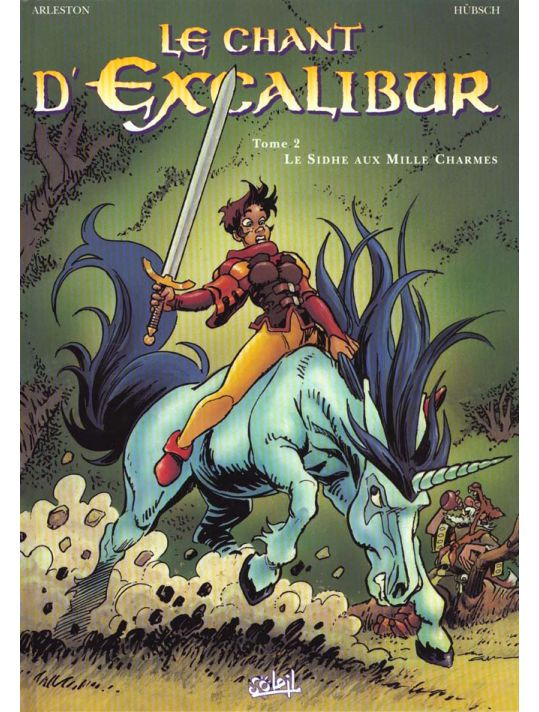
The duo Viviane/Morgan is most often treated as an antagonism. In line with the sources, Viviane appears as a kind fairy who raises Lancelot and acts to help Arthur dispel the schemes of his malevolent half-sister. [With a rare set of exceptions, including Fred T. Saberhagen’s Dominion which subverts many preconceptions by making Viviane a bloodthirsty high-priestess and Merlin a drunkard with a failing magic, closer to the buffoon that appears in the BD “Le chant d’Excalibur” by Arleston and Hübsch than to the medieval prophet] But the shadows among the medieval characters are enough to allow anyone to interpret them in various ways. Indeed, this sweet Lady of the Lake is also the woman that used Merlin to augment her own power before imprisoning him for all of eternity. And Morgan is at the same time the enemy of the Round Table and the crying sister which takes a dying Arthur in her arms to carry him away to Avalon. This ambiguity is complexified by numerous possible divisions or assimilations: Viviane is also Niniane or Nimue, except when they are all different characters. Mordred is either the son of Morgan, or of her sister Morgause. The sources vary a lot about these facts, and so do the modern authors – and the same thing applies to the love-romances that are woven between the enchantresses and their victims, between Merlin and his students. [Within the “Lancelot-Graal”, Morgan is said to have been the student of Merlin, but she is different from Viviane, another of his student who ended up imprisoning the wizard. Yet, there is a temptation to synthetize in one character the student, the mistress and the enemy. On another subject, the hatred of Morgan for the Round Table could be explained by her love for the cousin of the queen, a love that said queen managed to destroy. As early as the Middle-Ages we see the beginning of, not a rehabilitation, but at least excusing circumstances for Morgan’s criminal behavior towards her brother and his kingdom.]
The opposition of benevolent sorceresses and malevolent wizardesses is inscribed in a broader way within a specific conception of magic. If we can easily admit that there are things such as “white” or “black” magic, if we admit that there are wizards opposing witches (or necromancers), than this duality invokes the symbolism of good versus evil. In the context of the Arthurian legend, the magic that serves Arthur and his chivalrous ideal is supposed to be white, while the one of those that stand against him is black. It is the case with Stephen Lawhead or Gillian Bradshaw, where the future of the world depends on a battle between Light and Darkness. [Gillian Bradshaw created “Hawk of May” and “Kingdom of Summer”. The expression “Kingdom of Summer” is also very present within Lawhead’s work, reinforcing the link between those two authors. Lawhead prefers to name two of his characters Gwalcmai and Gwalchavad, “hawk of May” and “hawk of Summer”, rather than Gawain and Galahad. As for the opposition of the Light and the Darkness, we can be reminded of the two sides of the Force within “Star Wars”, which is filled with Arthurian references.]
But this symbolism also evokes several moral values that already prepare the question of how magic and religion coexist. Already in the Middle-Ages the limits are blurry when it comes to separating magic, religion, and science – especially medical science. (See Richard Kieckheffer’s Magic in the Middle-Ages) The knowledge of plants can be seen with suspicions, and the various invocations look very similar to each other, no matter if they are for a saint or a demon. All those contradictions coexist within the modern Arthurian literature as a whole, even though if most authors take care to establish a cohesive magic system within the setting of their tale.
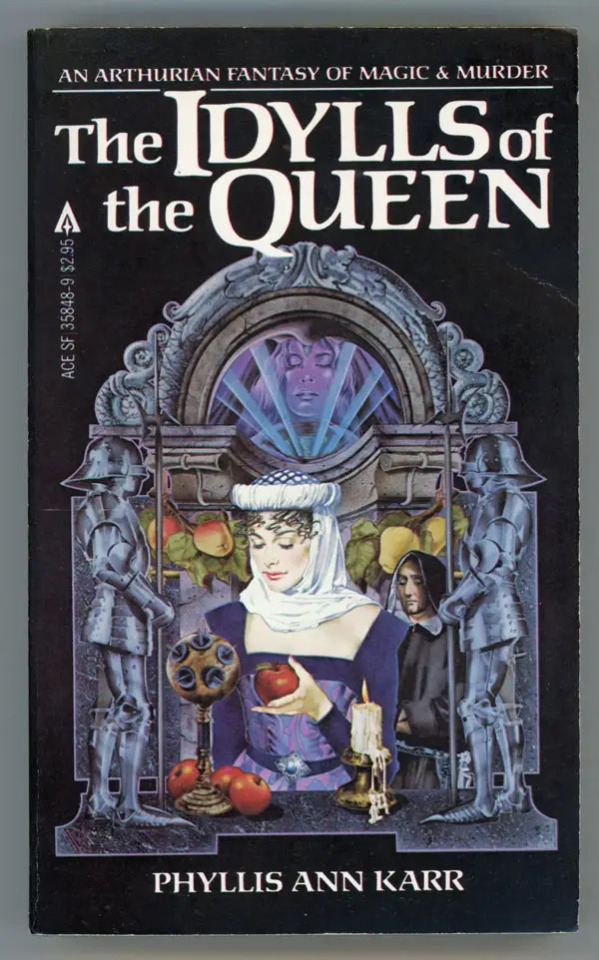
As such we frequently have an opposition between magic and religion, where magic relies on nature and traditional beliefs of which women are the bearers, while religion relies on a recent importation of Christianism and is presented as repressive and misogynistic. It is the case in Marion Zimmer Bradley’s work, where the magic is natural, “sympathetic”, against fanatical Christians who only dream of absolute power. Bernard Cornwell depicts a desacralized Christianity in an even darker light, as a religion only concerned with accumulating wealth by exploiting naïve pilgrims. The prayers are emphatic but useless, and the priest Samson, a future saint, has a rat-like face, a strong dislike of Guinevere and Nimue, as well as a heavily hinted preference for very young monks. The only Christian that is acceptable to the eyes of the narrator is the bishop Bedwin, who turns out to not be a quite faithful Christian, and an emblematic example of the improbable reconciliation of the extremes within modern Arthurians – a treatment of magic an religion that prefers the opposition of forces rather than their complementary. It forms indeed an explosive situation that is able to captivate more the attention of a reader rather than an idyllic statu quo. As such, what imposed itself as an Arthurian topos is the idea of a mostly pagan Britain attacked by the hegemonic projects of Christianism – despite the historical and archeological informations contraicting this view. The historicizing of the Arthurian setting is thus sometimes independent from the story, while not negating its realism or “vraisemblance”. [Adam Roberts, in “Silk and Potatoes” pointed out that in Lawhead’s work the Briton peasants are wearing silk, which is highly improbable, and that they cook with potatoes, an obvious anachronism.]
Stephen Lawhead tries to have a pacific shift from the old religion and its beliefs (assimilated to magic) to the Christian religion of the God of love. Taliesin, then Merlin, both have a revelation of the unicity of the divine, and as such their bardic invocations are now addressed to the Father, the Son and the Holy Spirit, but they stay unchanged in language or effect. What was once a spell or a trick becomes a miracle. Lawhead’s tale however is flawed by an oversimplification. If all this “magic” comes from God, then where do Morgian’s wicked powers come from? The unbreakable faith of Merlin within the superiority of God over Satan is admirable in a catechism context, but it removes an essential tool of the tale: its suspense. A duel between Morgian and Merlin during which the latter won’t suffer any blow, protected as he is by the armor of his faith, is quite disappointing, not to say boring. And what about the magic of the Small Folks, which seems to need a technical learning? The tale cannot fully escape a certain number of expectations, such as the oppositions between white and black magic, or between paganism and Christianity, or the presence of another “fairy”-like people cohabiting discreetly with the Britons. As such, while the attempt at Christianizing the supernatural is interesting because quite rare today (though it was very common in the Middle-Ages), is works badly.

It is a testimony of the weight of obligatory elements within the modern Arthurian fiction, a fiction that was shaped as much by contemporary successes as by, if not more than, its relationship to the medieval sources. If the articulation between magic and religion can be done in various ways, it stays in many cases a strong opposition between white magic/women/tradition, and religion/men/change. And since, outside of Merlin, most of the wizards of the medieval romances are women, magic is thus colored by femaleness, not to say feminism. In a world where male characters kill each other with weapons, women heal wounds with herbs and words. The image of the healer-Viviane, sweet and motherly, is opposed to the brutality of a world of warriors. At another level, it seems that the sorceresses embody the “fantasy temptation” while the warriors embody the “historical temptation”. [Raymond H. Thompson notes the gendered polarity within Arthurian rewrites since WWII, between a feminine movement closer to heroic fantasy, and a male movement, bloodier and closer to sword and sorcery (“Arthurian Legend in Science-Fiction and Fantasy”, in “King Arthur Through the Ages”)] As such, the novels that focus on the female characters also focus on magic, while those concerned with men and their wars are historicizing the Arthurian era. As Thomson said: “The focus thus shifts from warfare to the political and domestic conflicts that raise Arthur to power, and then destroy him.”
But if this is the case, where do we place evil wizardesses such as Morgan? They find their place within the rewrites that use abundantly of the supernatural, which is then vast enough to include both good and evil. Moreso, if the Middle-Ages offered a complex depiction of the enchantresses, the dark side of Morgane/Morgause stays dominant. Modern rewrites thus very easily use this malevolent aspect. It is the case of T.H. White whose second book, “The Witch in the Wood” was later renamed “The Queen of Air and Darkness” to designate Morgause. Gillian Bradshaw also depicts a fully evil Morgause who tries to teach her son Gwalchmai the occult arts. But he prefers the side of Light, and he joins Arthur and his knights. We find these two influences within Lawhead’s Morgian, also qualified of “Queen of Air and Darkness”, and who serves the Devil while Merlin fights by the sides of Arthur, the champion of Light. This distribution of the magical forces intensifies the motif of the conflict on several levels. The Darkness can be historical: the one of the “Dark Ages” at the beginning of the Middle-Ages, the one of the various disasters (war, plague, famine, insecurity) brought by the Saxon invader. But in a cyclical point of view, which extends the mythical side of the Arthurian theme even in rewrites that try to be historical, the fight between Good and Evil becomes recurrent. Arthur and Morgan (or her avatars) are easily identifiable archetypes. This repetition ability highlights the non-temporality of the myth and justifies the growing number of Arthurian rewrites: the myth is eternal, and thus must be eternally retold.
But these retellings do not simply replay the classical gigantic fight between the servants of the Light and those of the Darkness. A quite important number of modern authors chose to rehabilitate the unloved characters, mostly by giving them a voice. As such, the grudge-bearing, jealous witch of the medieval romances disappears, replaced by a loving and healing sister. Phyllis Ann Karr, within “The Idylls of the Queen”, offers a clever treatment of the character of Morgan, rehabilitated by a systematical refutation of the rumors, those that will become the “official” version of the legend later on. Morgan recognizes the facts, but offers other explanations for them, motivations misunderstood by her contemporaries and thus doomed to stay unknown (until the modern author reveals them, of course). This modern process of subverting the medieval stereotype (here the wicked witch that becomes the most faithful and loving servant of the Arthurian grandeur, pushing the devotion to a refusal to be offended by her bad reputation) can be declined in an infinite way, even on a parodic tone. Thomas Berger offers an anemic Galahad barely able to ride a horse, instead of the invulnerable knight supposed to be an “improved” version of his father Lancelot. John Gloag paints a Merlin prone to mistakes within his prophecies, and makes the entire announced and expected Arthurian glory a huge prank. T.H. White made his Lancelot ugly, where the Middle-Ages encouraged to see him as beautiful since he was “the perfect lover”.
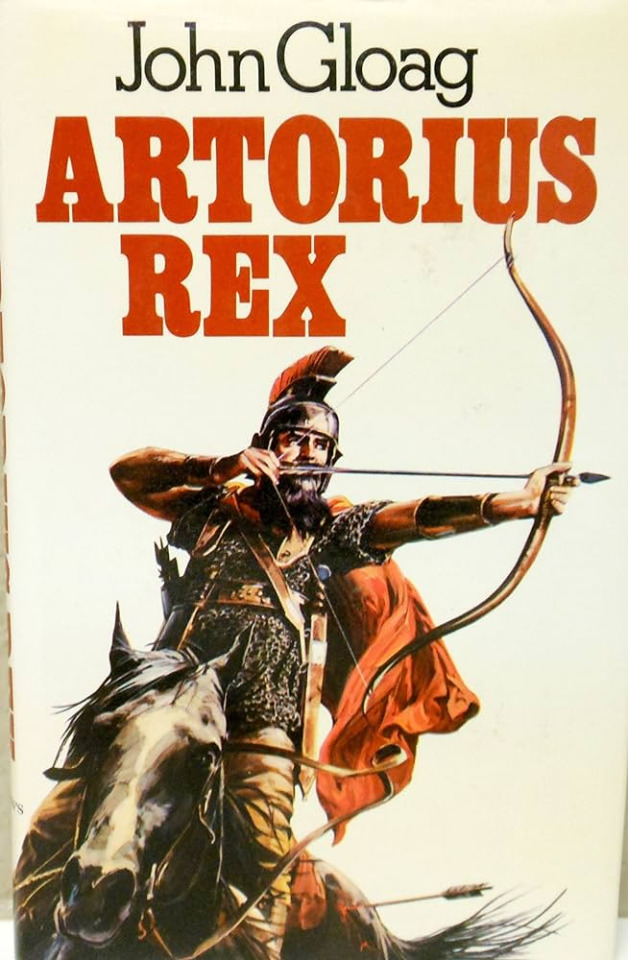
However, as with all process, this technique has its limits. By constantly subverting the reader’s expectations, we create new demands. Morgan is constantly rehabilitated, Lancelot is constantly made darker or disgraced by modern authors, who are numerous (maybe too numerous?) in trying to set themselves apart from their predecessors. Cornwell’s Lancelot is an arrogant coward, while in other novels he simply disappears as the lover of the queen and/or the right arm of Arthur. He is replaced by characters deemed more historical (Bedwyr for Rosemary Sutcliff or Joan Wolff), or by characters invented for the plot (John Gloag’s Wencla, Victor Canning’s Borio). As if suppressing the greatest Arthurian knight was needed to surprise the modern reader. Under such a light, the rehabilitation of witches as misunderstood sorceresses is almost becoming more stereotypical than the original model of the “truly wicked”.
It seems that, for now, the only true novelty that modern authors have not dared is an Arthurian novel without Arthur. But this path seems to be under exploration: Arto, Artos, Artorius, all spellings that can establish a difference with the original character is welcome, especially if it establishes a gap between the foggy and uncertain time when the legend was born and the era of the modern rewrite. The exploitation of the Arthurian prehistory is another sign of it. The Arthurian novel without supernatural is also another facet of this quest for a renewal. But since the “pure” historical novel has already been done in the past, the “new novelty” is the reintroduction of the marvelous – not in its original form, but in a subtler one influenced by the past historicizing. We entered an era of “rationalizing” and “walling” of the “merveilleux”. Rationalizing the wonderful means exploiting events and actions that can be given the appearance of magic ; “walling” the marvelous means limiting magical abilities to a specific group of characters, usually non-humans and thus marginalized.
#fantasy#arthuriana#arthurian novels#arthurian literature#viviane#lady of the lake#morgane#morgan le fay#magic#magic system#fantasy novels#fantasy worldbuilding#magic vs religion#merlin#nimue#morgause#lancelot
25 notes
·
View notes
Text
Luther, Calvin and Zwingli on Christmas by Will Graham

The leading Protestant Reformers –Martin Luther, Ulrich Zwingli and John Calvin- had different perspectives regarding the celebration of Christmas Day. Their three viewpoints are all alive and kicking in the contemporary Evangelical world. Today we are going to briefly outline what our three acclaimed Protestant forefathers thought regarding the festive season.
1.- Luther, Pro-Christmas Martin Luther. Luther, the fieriest, funniest and most charismatic of the three Reformers loved celebrating Christmas and he often preached upon the birth of Christ as 25th December drew near. Given that Luther embraced the normative principle of worship, namely, that all that the Bible does not prohibit may have a place in the church, the German felt entirely justified upon celebrating the incarnation of the Son of God in a special way at least once a year.
In his sermon entitled ‘To Us a Child Is Born’ (preached on 25th December, 1531), Luther honed in upon the faith of the shepherds who, “in spite of what their five senses told them […] concluded: this is the King, the Saviour, the great joy of the people. There was nothing great in the hearts of those shepherds save for the words of the angel. In fact, they were so great that except for them the shepherds saw nothing else. They were filled with those words just like drunkards and they made them known without being in the slightest bit concerned about what the great lords in Jerusalem and the Sanhedrin would have to say. On the contrary, without an inkling of fear, they preached of the poor Christ”.
The sermon, which was characterized by a sweet pastoral spirit, makes much of the perfect righteousness of Christ as the source of a Christian’s justification before God. “In and of myself I am a sinner,” preached the German, “but in Christ, in baptism and in the Word, I am holy”. That is the real message of Christmas. He who is Wonderful and Counsellor cleanses us from all sin by means of his expiatory death and resurrection. Luther took advantage of the festive season to declare the Good News that had so enthralled the Bethlehem shepherds.
2.-Zwingli, Anti-Christmas Ulrich Zwingli. At the other end of the Evangelical spectrum was Ulrich Zwingli. There can be no doubt that he was the most radical of the three leading magisterial Reformers. Nevertheless, the even more radical Anabaptists ended up splitting off from the Zurich preacher for two reasons: 1) Zwingli continued baptizing children; and 2) Zwingli did not believe that the church had to be independent from the State.
According to van Dellen and Monsma, Zwingli got rid of every ecclesiastical festive day in Zurich. Given that Zwingli embraced the regulative principle of worship, that is, churches should only do that which is explicitly commanded in Scripture, he opposed any celebration which was not mentioned in the Bible. This conviction, of course, is one of the key differences between Lutheran and Reformed churches.
It was this same belief regarding the regulative principle that led the Scottish Presbyterians and English Puritans to do away with Christmas celebrations. When the Protestant Oliver Cromwell served as Lord Protector of England, Scotland and Ireland between 1653 and 1658, Christmas was outlawed on a national scale.
3.- Calvin, Neither For Nor Against John Calvin As in the case of the Lord’s Supper, the one who had to mediate between Luther and Zwingli was the French refugee John Calvin.
Although Calvin accepted the regulative principle of Zwingli and not Luther’s normative principle, he believed that each local congregation could decide how best to celebrate (or not celebrate) the festive season. In spite of the fact that some have asserted that Calvin was in the anti-Christmas camp, the Frenchman wrote two letters in January 1551 and March 1555 outlining his stance with respect to Christmas.
In the January 1551 letter, Calvin explained that the Geneva authorities had done away with festive days before he arrived in the city whilst openly confessing that he did –personally speaking- celebrate “the birth of Christ”. In the March 1551 letter, Calvin hit out at those who criticized certain churches which opted to commemorate the festive period. According to the Geneva Reformer, such questions were “matters of indifference”. Each church could take the best decision after mediating long and hard upon the issue at hand.
In other words, the church has the liberty to decide whether or not to celebrate Christmas. But by no means should any church slander another congregation which takes the opposite course.
6 notes
·
View notes
Text
Hadith on Sins:
Three people will not enter Paradise
Abdullah ibn Umar reported: The Messenger of Allah, peace and blessings be upon him, said, “Three persons will not be looked upon by Allah Almighty on the Day of Resurrection: one who disobeys his parents, a woman who imitates men, and a man who allows his women to fornicate. Three persons will not enter Paradise: one who disobeys his parents, a drunkard, and one who reminds others of his charity.”
Source: Sunan al-Nasā’ī 2562
Grade: Sahih (authentic) according to Al-Albani
#islam#quran#islamic#muslim#islamicquotes#pakistan#islamic group#muslim community#muslim countries#istanbul#islamicpost#islamicreminder#hadith#muslim ummah#makkah#allah#muslimah#jannah#alhamdulillah#instagram
4 notes
·
View notes
Text
Did you know that a major portion of a person’s masculinity is seen in how his wife dresses up in public?
The Messenger of Allaah ﷺ said: ❝There are three at whom Allaah will not look at on the Day of Resurrection:
1) The one who disobeys his parents,
2) the woman who imitates men in her outward appearance,
3) and the Dayyooth (cuckold).
And there are three who will not enter Paradise:
1) The one who disobeys his parents,
2) the drunkard,
3) and the one who reminds people of what he has given them.❞
[Sunan al-Nasaa’ee (2562) and graded as “Hasan Saheeh” by Shaikh al-Albaanee]
Dayyooth (a man with no protective jealousy for his wife/daughter/sister. He is the one who approves of evil conduct in his family. He allows them to intermingle with non-Mahram men. He sees them doing something objectionable, but does not feel bad nor stop them.)
2 notes
·
View notes
Photo
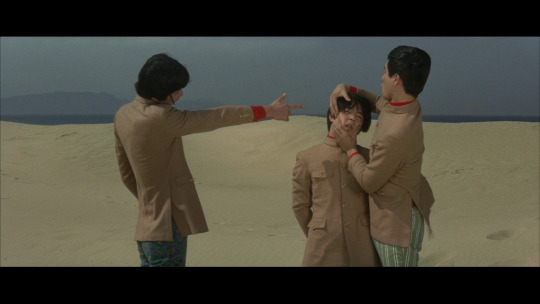
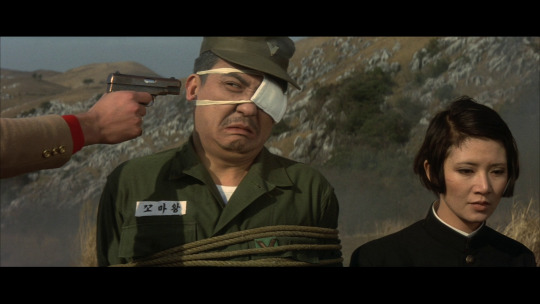
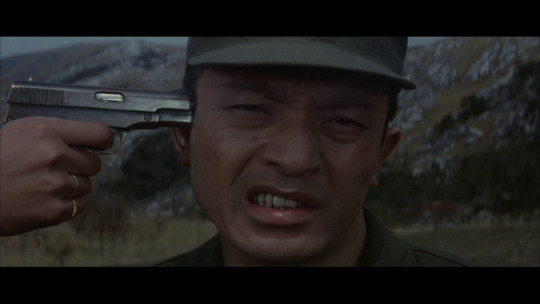
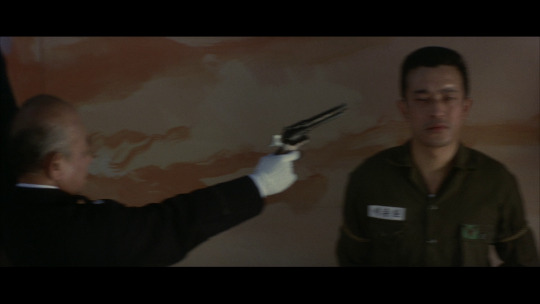

The most prevalent anti–Vietnam War motif is the recurring reference to the infamous photograph taken by Eddie Adams on February 1, 1968, which came to be known as “General Nguyễn Ngọc Loan executing a Việt Cộng prisoner in Saigon.” In the photo General Nguyễn stands to the right (screen left) of a Việt Cộng prisoner, pointing a handgun at his head. This image is restaged many times in the film, from the boys using their fingers for a gun (as early in the film as when they are on the beach in the first sequence) to pointing the gun at the stowaway Korean corporal, to the realistic mural depicting the photo-image at the end with the execution of the Korean corporal staged in the background. Considering that the film was released only two months after the photo was published one can feel the white-hot immediacy of Oshima’s film.
- David Desser / “Oshima, Korea, and 1968” (1968 and Global Cinema, 2018)
Nagisa Oshima
- Three Resurrected Drunkards
1968
#nagisa oshima#Nagisa Ōshima#three resurrected drunkards#大島渚#帰って来たヨッパライ#kaette kita yopparai#japanese film#1968#sozosha#創造社#execution of nguyễn văn lém#eddie adams#nguyễn ngọc loan#nguyễn văn lém#vietnam war#parody#佐藤慶#kei sato#kei satō#渡辺文雄#fumio watanabe#mako midori#緑魔子
97 notes
·
View notes
Photo
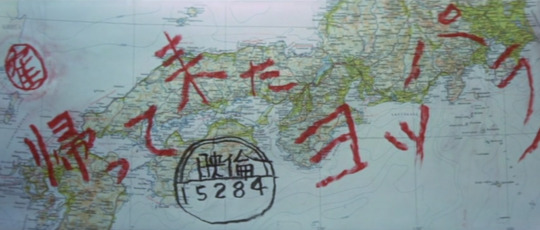
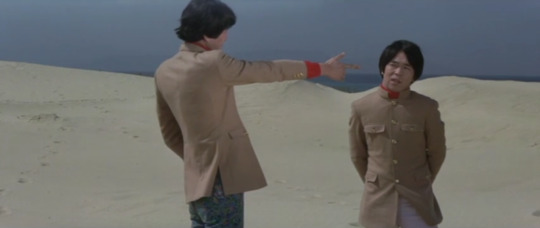

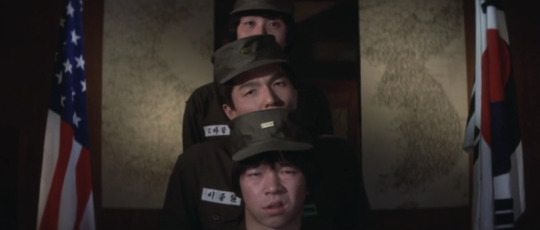
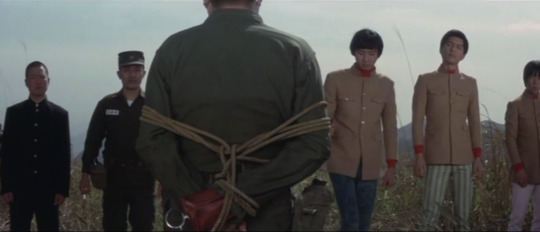

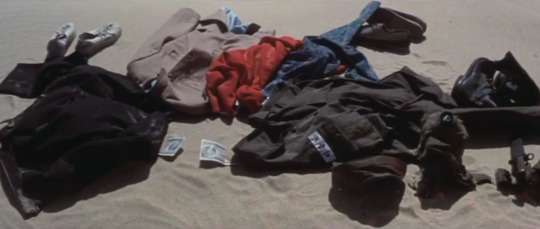
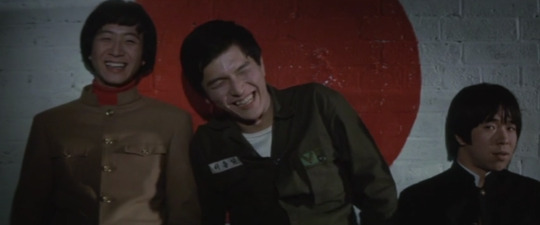
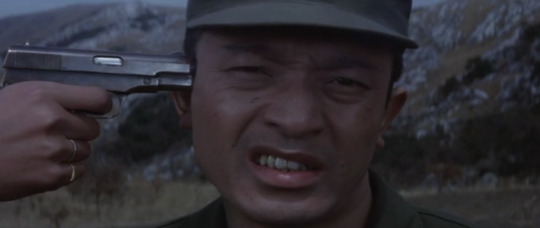
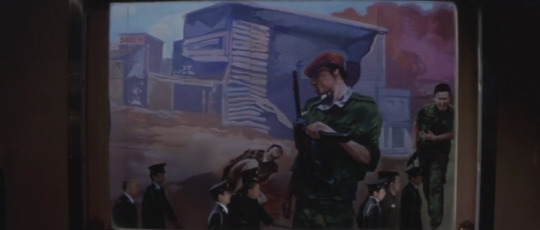
Three Resurrected Drunkards (1968)
#three resurrected drunkards#nagisa oshima#Nagisa Ōshima#kazuhiko kato#osamu kitajima#norihiko hashida#kei sato#cha dei dang#talks
8 notes
·
View notes
Photo




three resurrected drunkards dir. nagisa oshima
9 notes
·
View notes
Text
Ichinose Clan Theory — The meaning behind Guren’s crest
I already talked in a post that I recently made about how Kagami used the prestigious Tokugawa Clan as a reference for the Sangū Clan:
https://distinguished-slacker.tumblr.com/post/652605760110542848/sang%C5%AB-clan-theory-the-meaning-behind-mitsuba-and
However, while doing this research I randomly happened to find a clan that could be the reference for the Ichinose Clan:

That is the Saitō Clan (斎藤氏). The Saitō Clan was a Japanese samurai clan from Echizen Province, Fuku Prefecture. This family ruled over the Mino Province, which bordered the Owari province that I mentioned in my previous post. Saitō Dōsan was a powerful warlord who married his daughter to Oda Nobunaga, who was Japanese “daimyō” (a Japanese magnate or feudal lord) and one of the leading figures of the Sengoku period. Oda Nobunaga was one of the "Great Unifiers" of Japan along with Tokugawa Ieyasu and Toyotomi Hideyoshi. However, Saitō Dōsan and his son Saitō Yoshitatsu were defeated by the Oda and died in 1564. Saitō Yoshitatsu’s son was known as a drunkard who was unable to govern and was defeated by the same Oda Nobunaga three years later. As a consequence, the Saitō clan disappeared in 1567. It sounds similar as to how the Ichinose Clan lost their prestige.
But why am I sure why the Saitō Clan was used as a reference for the Ichinose Clan?
This is because of Rígr Stafford who refers himself as ‘Saitō’ and who coincidentally happens to have a relation with the Ichinose Clan as seen in Volume 2, Chapter 1 of the Resurrection at 19 Light Novels:

Although it wasn’t Saito who initially created the Ichinose Clan, as it was Sika Madu who created the whole Mikado no Oni, and so the Hīragi family and the 10 branch houses serving under them, it was indeed Saito who was the perpetrator of the incident that happened 500 years ago that caused the Ichinose Clan to separate from Mikado no Oni, form Mikado no Tsuki, and become “pariahs”. Moreover, as it is mentioned, similar to how Sika Madu insterted his own cells inside some members of the Hīragi family (or possibly all members in all generations since 1200 years ago), Saito inserted some of his own cells inside an Ichinose Clan member 500 years ago, and so all of his descendants, including Guren, still contain these cells inside their bodies to this day. This means that if Sika Madu is the God and creator of Mikado no Oni, then Saito would be the God and creator of Mikado no Tsuki.
To further support this claim, let’s have a look at the crest of the Saito Clan:

Doesn’t this shape remind you of the pendant that Guren wears at the center of his uniform collar?
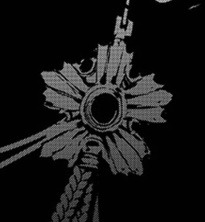
There has been some discussion over the years when it comes to guessing what actually the shape of Guren’s pendant is; some people said it is a Sun while others say it is a cherry blossom flower. But what if it’s neither of them?

First, the ones who claim it’s a Sun is because then it would complement the Hīragi Clan Moon pendant, more specifically Shinya, as Shinya’s name means “midnight” while Guren is called the “Sun” more than once, acting as foils to each other. However, if you have a closer look at it it’s hard to completely affirm that it’s a Sun because the circle is way too small in comparison to what the Sun rays would be and the five division of the rays resembles more a flower.
Here come the ones who claim it’s a cherry blossom. This is further supported by the use of the cherry blossom in OnS. When Guren attended Shibuya First High School for the first time, the cherry blossoms were in their blooming season, which is March/April. Also, in volume 14 of the manga, Mahiru happens to be seated on top of a cherry blossom tree with Guren behind her, and some people have theorised that the cherry blossom represents Mahiru because the flower symbolises the fleeting nature of life, as Mahiru “died” when she was only sixteen. There is also the fact that people assume it’s a cherry blossom because it’s one of the easiest flowers to recognise. But let’s have a look at how a cherry blossom actually looks like:

The edges of real life cherry blossom petals are really smooth, and no matter what cherry blossom “Sakura” symbols you look at on internet, the petals always have this particular rounded, slightly pointy with an inwards triangular cut at the middle edge shape. But the petals of Guren’s flower emblem are way too rough and irregularly shaped to belong to those of a cherry blossom flower. Then, to what flower it belongs to?

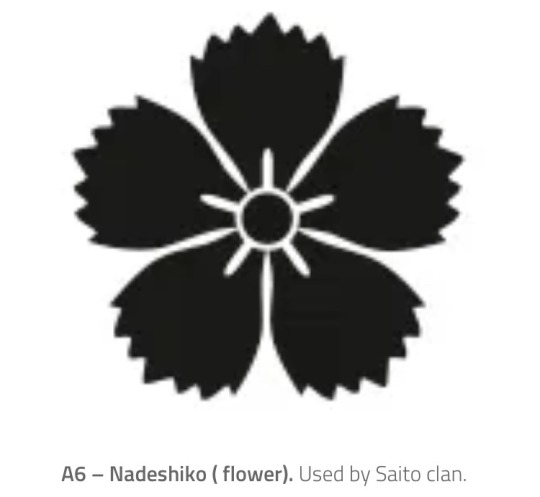
This flower is the Nadeshiko flower Dianthus superbus or the fringed pink or large pink. As you can see, it has five petals which have rough edges like those of Guren’s crest. One of the regions this flower can be found is in Japan and it occurs at high altitudes, up to 2400 m. This reminds me of how Guren’s home is mountainous. But putting that aside, some fans of Japanese culture might recognise this name from the ‘Yamato Nadeshiko’, which is the personification of an idealized Japanese woman. According to this ideal, this woman has to feminine, poised, gentle, humble, patient, honest, charitable, benevolent, chaste and devoted to her husband, always submissive to him, dedicated to the family, bonus points if she looks weak, delicate, with pale skin and long, straight dark hair, preferably black. So then, who does fit this role?

This is no one but the Ichinose girl who lived 500 years ago. In this panel taken from the Catastrophe at 16 manga, you can see how she has very long dark hair, and the way she gracefully holds the fan gives the idea of a sophisticated and feminine woman. Saito even calls her an “alluring girl”. Then it comes the idea of weakness and care for the family. The poor girl was one of the victims of Saitō’s plans and a victim of rape at the hands of the first Hīragi son as an act of jealousy because said girl chose his younger brother, the second Hīragi son. This girl in the end had the baby, who was accepted by the second Hīragi son, even if it wasn’t his son, and these three lived as a family after. However, they had to live a life of humiliation, being so powerless even to their last breath. Furthermore, the idea that the Yamamoto Nadeshiko name belongs to the Ichinose Clan in the OnS world, is that Mikado no Tsuki remained very traditional in comparison with Mikado no Oni, still living in a traditional Japanese mansion, wearing Japanese robes and being given a traditional education. The most obvious proof of this is how Sayuri, a member of Mikado no Tsuki, was raised by her family to fit these roles to serve Guren appropriately, as seen in the afterword that she appears in:

So in conclusion, Guren’s crest represents the Nadeshiko flower. Of course I could be wrong, and it could be either the Sun or a cherry blossom but I think it’s worth to mention this other option as I haven’t seen anyone else write about it. There is also the possibility that it doesn’t have to be only one flower. Saito was the one who planned the meeting between the Ichinose girl and the two Hīragi sons 500 years ago. 500 years later, the same Saito plans the meeting between the Ichinose son, Guren, and the Hīragi girl, Mahiru. Maybe the flower that represents the first meeting is the Nadeshiko flower and the second meeting is represented by the Sakura flower (cherry blossom). The Nadeshiko flower symbolised the kindness but futility of the Ichinoses in the past and so became their crest but maybe the Sakura flower, which also has connotations about fragility but at the same time represents time of renewal, may indicate that this time the Ichinose clan (or what remains of it) will be able to finally break their chains in this era.
I hope you liked my theory! :3 I swear I only began with researching only about Mitsuba, but then somehow I made a theory about the Sangūs, and then somehow I ended up with a theory about the Ichinoses, which lead me to the topic of Guren’s crest. What a chain of events😅
P.S. My GureShin heart is suffering right now guys🤧
#owari no seraph#guren ichinose#rigr stafford#catastrophe at 16#resurrection at 19#ichinose guren catastrophe at 16#ons#seraph of the end
75 notes
·
View notes
Text


Three Resurrected Drunkards
#three resurrected drunkards#nagisa oshima#film#cinema#criterion collection#japanese cinema#60s cinema
0 notes
Text
Book of the Dead
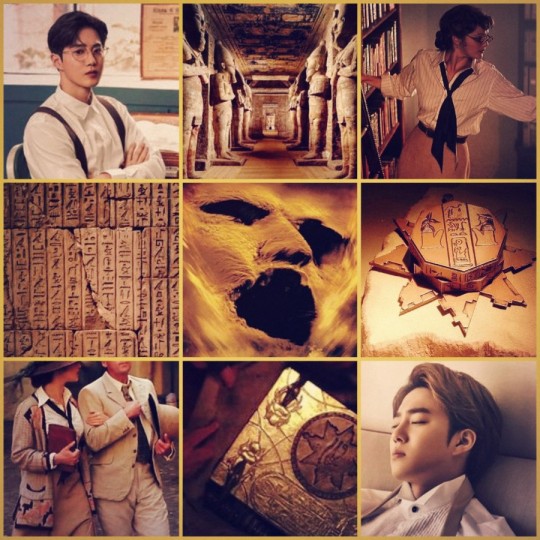
Genre: The Mummy AU
Pairing: Junmyeon x Reader
Summary: After traveling to the fabled city of Hamunaptra, you read from the Book of the Dead and accidentally resurrect an ancient mummy with extraordinary powers and quest for revenge. The only thing to do now is try and convince your less-than-traditional guide to help you save the world.
Part 1 I Part 2
**
“I just said a few sentences!”
“What did you do that for!”
“Well, I didn’t know that that would happen!”
You stared at the aggravating, self-absorbed, cocky Korean soldier and wondered why on earth you had decided to negotiate for this man’s life.
Alright, you did know why. You needed him to show you to Hamunuptra - the fabled City of the Dead.
Too many times you had stood in front of the museum curator with pages and pages of references and evidence that the place existed and just needed a small team of archeologists in order to track it down. He’d shot you down every time. And each time he took the liberty of reminding you that while your father was an exceptional explorer who had many successes under his belt, you were a woman whose life had been spent between the shelves, cataloging. Your adventures consisted of the fictional kind, devouring any novel you could when you weren’t archiving the latest crate of artifacts and texts.
Then your cousin showed up. Your normally useless, hare-brained, erratic, drunkard cousin showed up at your apartment with a “fun new artifact” he found on his latest trip. And suddenly your luck had completely turned around.
Or so you thought.
Now you were standing in the middle of Hamunaptra, feet sinking into the unstable sand, with an empty sarcophagus and everyone blaming you because you did what you did best - read.
It was only a book. Albeit, a very heavy, possibly-made-of-painted-solid-gold book that was written in the dead language of ancient Egypt, but still. What harm had ever come from reading a book?
Kim Junmyeon stared at you as if you were the one who had risen from the dead. You were still stunned at how different he looked from when you had first met him in that smelly prison, minutes away from being hanged. His hair had been long and stringy, clumps of dirt clinging to the dark brown strands that brushed his shoulders. Now it was shorter, cut above his ears and gelled back in the current style that almost made him look like a gentleman. The several days’ stubble was long gone to reveal smooth skin and a sharp jawline. He was actually very handsome - when he was cleaned up.
Stupid, you hissed at yourself. Now was not the time for this. Because right now there seemed to be a reanimated mummy running around here. And by the looks of Barney’s husk of a body lying deep within the temple underground, it was hungry.
As it should be, given the three thousand years it spent locked up under piles of sand.
“Really, you should have been more careful!” your cousin, Baekhyun, scolded.
You scoffed. “You’re one to talk. You were the one who snatched the key off of Mr. Kim here at one of your seedy bars and then proceeded to lie to me and say that you found it on a dig in Thebes which in turn brought us here!”
Baekhyun opened and closed his mouth as he searched for a possible retort.
“I think this is more your fault,” Kim Junmyeon’s own cousin and traveling partner, Oh Sehun, said. “You told us to go down a level and dig under the statue, which in turn,” he mocked your tone almost precisely, “caused the mummy to be able to get out of his sarcophagus. If we had dug somewhere else entirely, then he’d still be trapped under the statue of Anubis.”
“Despite the fact that it was two layers deep, nothing would have been able to hold a victim of the Hom-Dai.”
“Would have given poor Barney a chance,” Kim Junmyeon muttered under his breath. You shot him a glare that he hardly noticed.
“I say that we get out of here and to the safety of the city before the mummy finds us.” Oh Sehun swallowed thickly. “Or worse. The beetles find us.” The supposedly brave soldier who had two pistols hanging under each arm was more terrified of the flesh eating bugs than he was the living mummy that was bringing about the ten plagues of Egypt. You’d already lived through the locust infestation, but that was always the most minor of the plagues. In your opinion.
“We told you to leave,” Ardeth said in that low, monotone voice that made him seem centuries old. You had only known him for a few hours, but you already feared and respected him. Despite the fact that he had attacked your campsite the night before. “Now you have condemned the whole world to the very monster that we have spent three thousand years keeping hidden.”
Kim Junmyeon finally tore his face away from yours. “I told you. I shot him. He went down.”
“Mortal weapons are useless against this creature. None can kill him.” Stepping up, he stood toe to toe with the soldier who led you here. “A gun is nothing more than a fly to him. He will never eat. He will never sleep. And he will never stop. Not until this world is only sand.”
Though still not completely backing down, Kim Junmyeon took hold of your arm. “Come on. We’re going back to Cairo.”
**
The camel ride back to the city was long, tiring, and a bit painful, if you were honest. The inside of your thighs were sore from keeping you up right on the animal’s back for hours on end under the blazing heat. You were used to the comfortable back seat of a car, even if the roads here tended to be on the bumpier side. Kim Junmyeon stayed at your side the entire time, up until you were back in your hotel room. All your things were still in there. That was nice, even if it was to be expected. The desk clerk had sworn he would keep the room reserved for you until you made it back. And now that you had, you were on to the next fight.
“We’re not going anywhere!”
Kim Junmyeon pretended not to hear you as he started emptying the dresser drawers of your clothes and stuffing them in your suitcases lying open on the bed.
“Excuse me! I said we’re not going anywhere!” As soon as he stepped away again, you slammed the suitcase shut. A stray white cat that you didn’t have the heart to remove from your room took advantage of the newly available space and laid down on the surface of the luggage. Unbothered by the argument taking place in its presences, it purred as it curled into a ball and closed its eyes.
“You keep using the word ‘we’ and I’m not sure why,” he said. “I believe you were the one who woke him up in the first place.”
“Yes, I get it!” you shouted. “Everyone can blame me because I read the damn book, but that is why we need to stop him.”
He closed the empty drawer and turned back around to face you. “And how exactly do you plan on doing that? You heard Ardeth. No mortal weapon can kill this guy.”
“That’s why we’re going to find some immortal ones.”
He pulled a pair of rounded glasses from his pocket, wiped the lenses with his shirt, and stuck them on the bridge of his nose. “There goes that ‘we’ business again.”
You huffed, trying not to focus on the newest version of the soldier now being presented in front of you. “Yes, we. Because this curse will continue to get worse until the whole world is destroyed.”
“And that’s my problem?”
“It is everybody’s problem! You live here, too!”
Kim Junmyeon stepped up until he was mere inches away. “Listen. I appreciate you saving my life and all, but when I agreed to this idiotic mission my objective was to show you the way and then bring you back here. I have done that. End of job. End of story. Contract terminated.”
You tried not to show how his last few words affected you. Though you had been a little intoxicated two nights ago, you still very much remembered how sweet he had been, how he had listened to you go on and on about your parents and how much you wanted to be a famous adventurer like your father. And how you almost kissed him. And how he was going to kiss you back. Stupidly, you had thought that there was something growing between you. Apparently, you had been wrong.
“Is that all I am to you?” you whispered. “A contract?”
Kim Junmyeon blew out haughtily from his nose. His Adam’s Apple bobbed as he swallowed. He opened his mouth and then closed it. You waited in hopes that he would contradict you. That he would say, no that was not all you were to him. And it really seemed like he would be saying something along those lines. But other words came out instead.
“Look. You can either come with me or you can try and stay here and save the world. So. What’s it going to be?”
You didn’t even hesitate. “I’m staying.”
“Fine.” He headed for the door.
“Fine,” you bit back, following him.
“Fine,” he threw at you again as he barely glanced over his shoulder.
“Fine!”
“Fine!”
He got the last word in before slamming the door to your room shut.
You huffed as you crossed your arms. Yet, as angry as you were, you still hoped that he would come back. That he wouldn’t let you take this on alone. But the footsteps on the other faded away and you were alone.
Looking around your room, you didn’t think there was much you could do. So, you did what you were best at. You grabbed all the books you thought could help you and got to reading.
While sitting in the wicker chair in the corner, you skipped around the books and pages, clinging on to any small word that you thought could lead you to a possible solution. There wasn’t much to be found, unfortunately. Most works spoke of how to perform the Hom-Dai and how it should never be performed due to the curse that awaits should the victim ever be awakened. You already knew that. You needed specifics on what to do after the victim came back.
“(Y/n)!”
Kim Junmyeon came bursting back into your room. You slammed the book in your hands closed, feeling very high and mighty indeed.
“Ah. Mr. Kim. Have you changed your mind?”
“Doesn’t matter now, he’s here!”
“What!”
He didn’t clarify as he hoisted you up out of the chair and pulled you out of the room, and into the hall. Through the windows, you watched in horror as fire fell from the heavens. The balls of flame engulfed anything it touched when it landed, whether it be plant or human life. Turning a corner, Kim Junmyeon ran into a room you knew was occupied by another one of the Americans that you had ran into on your way to Hamunaptra. You gasped.
In the chair, now nothing more than dried, husky skin and hollow bones was… oh, dear you couldn’t remember his name. You hadn’t bothered to learn them. You and Baekhyun had simply referred to them as the “Bloody Americans”. You were feeling a bit awful about that at the moment.
But you didn’t have much time to dwell on that. Standing in front of the fireplace was a new version of the mummy. His skin was starting to come together, though patches were still missing, allowing you to see the gray bone and lack of organs underneath. Kim Junmyeon pulled out both of his guns as the mummy stalked forward.
“We are in deep trouble,” he murmured before opening fire. The loud pops banged on your poor eardrums. You stumbled back a few steps to try and soften their blows. It didn’t work.
The bullets passed through the mummy as if they didn’t exist at all. Even when Oh Sehun and the other Americans came running into the room and firing off their own guns, the mummy still kept going. He shoved Kim Junmyeon back into the others as if he were nothing more than old wrappings. Then he turned on you.
Completely unarmed, you stumbled back until you were betrayed by the bookshelf behind you. There was nowhere to run. Instead of sucking out your liver, however, he spoke.
“You were the one who saved me from the afterlife.” His words were haunting, echoing as if he was speaking in a cavern. And the language he spoke… ancient Egyptian. You weren’t sure why you expected to speak anything else. Coming in closer, he lowered his voice. “I thank you.”
He leaned in his head, those very human eyes lowering to your lips. You turned your head away to try and avoid the kiss, confused as to why he was trying to seduce you.
Sharp, unpleasing notes from the piano pierced through the air. The mummy turned and gasped when he saw the white cat from your room walking across the keys. In a whirl of sand, he fled from the room.
“Oh, thank god,” you said with a heavy breath.
“No kidding,” Kim Junmyeon groaned as he sat up.
You ran to his side, fearful that he might have been injured. “Are you alright, Mr. Kim?”
“Yes,” he huffed. With a very odd expression, he added, “And I told you to call me Junmyeon.”
To be honest, after your fight, you didn’t think you would be allowed to anymore. A strange silence settled between you. He was trying to say something with his gaze, but you couldn’t interpret it. So, instead, you helped him to his feet. “Come on. I know who we need to talk to about all of this.”
It took a while to get back to the museum that had employed you for the past year or so. Every street was full of panicking people. Flames no longer fell from the heavens, but little fires still raged on homes and carts. The Americans had declared that they were coming along, so your group was slower in moving. Although you didn’t really want the mummy bait to be anywhere near you, Junmyeon and Sehun decided that it would be better to keep an eye on them and - hopefully - keep them out of the mummy’s grasp.
“Dr. Bey!” You ran into the museum’s main storage room, happy when you saw the curator. But then you skidded to a stop at the sight that he wasn’t alone.
Ardeth was talking with him in hushed tones that stopped the second you appeared. Both men turned towards you, the curator wearing a very readable expression. It was one that stunk of “I told you so”. The others were only a few steps behind. As soon they, too, saw the unexpected visitor, Junmyeon, Sehun, and the Americans pulled out their guns while Baekhyun simply squeaked in surprise.
“Gentlemen,” Dr. Bey greeted as if this were any old meeting on a Tuesday.
“What is he doing here?” Junmyeon demanded. Even with the black tattoos etched under Ardeth’s eyes, you could tell that he was tired, dark circles from lack of sleep bruising his skin.
Dr. Bey raised an eyebrow. “Are you sure you want to know? Or perhaps you would prefer to just shoot us?”
“Either sounds good.” Junmyeon cocked back the hammer of one of his guns for emphasis.
“Stop it,” you hissed. “Bullets won’t do any good here. Besides, you might damage some of the artifacts.”
Junmyeon failed to suppress a laugh over your concern. Despite the present danger, you still didn’t want to see the carriages or sacred jars damaged because someone got trigger happy. So, Junmyeon holstered his guns and the others soon followed suit. “All right. I’ll give a little faith.”
Dr. Bey motioned for the group to follow him in deeper. “We’re part of a secret society-”
“Aren’t they all?” Baekhyun muttered. Both you and Dr. Bey shot him glares that made him snap his mouth shut.
“For over three thousand years, we have guarded the City of the Dead. Once we reach manhood, we swear an oath to do anything and everything in our power to stop the high priest Imhotep from rising from the grave.”
“And now we have failed. Thanks to you.” Ardeth gave you a particularly pointed look.
By now, you were getting very irritated with the constant finger pointing. What was done was done. You were not going to show him any cowardice. “And that justifies the murder of innocent people?”
“Hm. To stop this creature?” Dr. Bey pretended to think for a moment. “Yes.”
Junmyeon, untroubled by that, raised his hand from the golden seat of a dead royal that he had taken over. “I have a question. Why doesn’t he seem to like cats?”
“Cats are the guardians of the underworld. He will fear them until he reaches full regeneration.”
“Then there will be nothing that he fears.” Worry was very much apparent in the soldier’s voice.
“And you know how he gets regenerated?” one of the Americans asked rhetorically.
The other one finished. “By tracking those of us down who opened the chest and sucking us dry like a nomad in the desert, that’s how!”
It was completely pointless to go over the things that were already known. Now was the time to try and piece the unused parts together. Two particular moments were sticking out in your head.
“Back in Hamunaptra, the priest - Imhotep - he called me Ack-Su-Namun. And then just now at the hotel, he….” You cringed at the memory, thankful that you didn’t have to feel the decomposed skin against your own. “He tried to kiss me.”
“It’s because of Anck-Su-Namun and his love for her that he was cursed,” Dr. Bey explained, exchanging a look with Ardeth. “Even after all this time….”
“He’s still in love with her?” Sehun finished with a scoff.
You appreciated the backstory, however - “As romantic as that is, what does that have to do with me?”
“Perhaps he will try to raise her from the dead once again?” Ardeth guessed.
“Yes,” Dr. Bey agreed solemnly. “And it would seem that he has already chosen his human sacrifice.”
All eyes in the room turned to you. Wonderful.
Not only were you the one who read from the book and raised him, but you would also be responsible for the return of his beloved, who was the reason he was cursed in the first place. Absolutely beautiful.
Baekhuyn came up behind you and patted your shoulder. “That is some rotten luck, dear cousin.”
“Actually, this could work in our favor,” Dr. Bey countered. “It could give us time that we desperately need to kill the creature.”
“We’ll need every second, I think,” Sehun said. He pointed towards the ceiling. “I think he’s getting stronger.”
Through the large window high up on the wall, the sun was in clear view. You all watched in horror as the moon moved too quickly across the sky and blocked the light from reaching Earth.
“I’m guessing this is the plague of darkness?” Baekhyun said ominously. You nodded slowly.
“Let’s go,” Junmyeon said softly beside you, his hand coming up protectively behind your back. “We’ve got to get back to the hotel and come up with a plan.”
**
“I’m just saying, it seems very stupid to comdem someone to a curse when the result of that would be for them to come back a supernatural creature who is practically unkillable.”
“The ancient Egyptians believed in balance,” you explained to Baekhyun for the hundredth time in your life. “To curse someone so badly in both this life and the next, there has to be a consequence to balance out the scales. If not, then the whole world could still fall apart, in even worse ways!”
“All of this is kind of pointless now, isn’t it?” Sehun sighed from the small table in the antechamber to your room. His feet were up on the polished surface as he leaned back in his seat. A look of irritation was etched on his face as he stared at your cousin. “What’s done is done. Right now, we need to focus on our next step.”
“Well, I know you two,” you pointed to the Americans, “opened the chest. As well as Barney. Was there anyone else?”
“The Egyptologist that was with us,” the shaggier one answered. “Professor Chamberlain. He has a temporary residence a few blocks over.”
“What about my best friend Beni?” Junmyeon asked. You nearly snorted. You knew the two of them were anything but friends.
“No. He ran out before we took the lid off. Ended up saving his own skin.”
“Sounds like Beni,” Junmyeon said dryly. “Okay. We’re going to go get the Professor. You four,” he pointed to all the men, “come with me. You, stay here.”
Oh, no you weren’t. “Excuse me! I am just as capable as any of them are. I will not- What do you think you’re doing!”
Junmyeon marched over to you, picked you up, and carried you over his shoulder until you were in your room. Then he dropped you on the floor, closed the door, and locked it tight. “This door doesn’t open.”
You didn’t know who he said it to, who he left in charge of watching you like an infant. It didn’t matter. You pounded your fist against the solid wood door. “Baekhyun! Junmyeon! Let me out! Baekhyun, you coward! Help me out here!”
“Sorry, cousin!” Baekhyun yelled on the other side of the door. “But… he’s got a gun.”
“Smart choice,” you heard Junmyeon say. Oh, you were going to kill him. Which “him” was yet to be decided. Perhaps both would be most satisfactory.
Well, now you were stuck here.
Crossing your arms, you sat on the edge of the bed and contemplated your choices. Not that you had many.
A yawn forced its way out. You were tired. Over the past few days, you had hardly been able to get any real sleep. And, well, now seemed to be a time. So, you changed into your nightgown and slipped under the covers. The mattress was soft, like a cloud. The pillows were stuffed into freshly cleaned cotton cases. It was barely a few minutes before you drifted off…
And then abruptly woke up to something moving against your mouth. It started out soft but quickly turned ashen and tough. Your eyes flew open and you screamed, the sound muffled by the kiss of Imhotep!
You tried to shove him off, but he didn’t budge. Your touch meant nothing to him as he continued the unwanted kiss.
The door to your room burst open, finally taking his attention and allowing your scream to be heard at full volume. Imhotep’s face was half rotten away, his lips completely gone, the cheeks held together by thin strips of jerky-like skin. You scrambled out of reach, to try and get as far away as the tiny room would allow. The movement caused you to fall out of the bed and land hard on the wood floor.
Standing up, Imhotep said something in ancient Egyptian, but your jumbled, still half-asleep brain couldn’t translate it.
“Oh, really?” Junmyeon mocked. “Here’s my answer.” He held up the poor cat who had saved you earlier, the animal hissing threateningly at the mummy. Just like last time, Imhotep fled in a tornado of sand out the window, terrified of the innocent creature.
“Are you alright?” Junmyeon asked as he let the cat fall from his hands. The cat landed gracefully on its feet and walked over to the bed with more dignity than you’d ever seen a human radiate.
“Yeah, I’m good,” Baekhyun answered. After a glare from Junmyeon, he cleared his throat. “Oh. You weren’t- that’s fine. Go… check on her.” Junmyeon did just that.
Kneeling in front of you, he pushed away a few stray hairs that had fallen in your face. Warm, soft brown eyes searched for any sign of harm. The tips of his fingers brushed against your cheek, setting the skin on fire. Or perhaps that was just the blood rushing up to your face in slight embarrassment. This man made you… nervous in a way. He could be dastardly at times, but… also very sweet.
Clearing your throat, you pushed yourself up to your feet. “I’m fine. A little disgusted, but I’m fine.”
A smirk and knowing gleam flashed on Junmyeon’s face as he rose. “I’m sure mine was better.”
He was referring to the lip-smash he desperately pulled before he was to be dragged to the hangman’s noose. Not exactly the best first impression.
You snorted. “No. I wouldn’t say that.” His jaw went slack. Sehun and Baekhyun snickered behind him. “Did you find the professor?” you asked in order to change the subject.
“Yeah. He stayed out in the sun for a little long by the time we found him.”
“What are you-” Oh. Oh. That was why Imhotep was so far along in his regeneration. He’d found another victim to suck dry.
“And he has the Book of the Dead,” Sehun added. “According to Beni, that’s what he’s going to use to raise Anacsunmum.”
“Anck-Su-Namun,” you corrected.
“Yeah, her.”
You rolled your eyes. Why did you even bother?
You started pacing the room, trying to figure out what would be the best next move. You couldn’t keep playing hide and seek with the cat for all eternity. There needed to be a way to end this. Before he read from the book and raised-
The book…
The book!
You whirled back to the others. “I have an idea!”
“Care to share?”
“The Black book has always been rumored among scholars to be able to bring people back from the dead. Something I had always thought was nonsense,” you added to yourself. “But since that part is true, that means other rumors must be as well. Such as the Gold Book being able to send a soul back to the afterlife.”
“A balance.” Baekhyun looked awfully proud of himself. At least something finally stuck.
“Exactly. Now all we have to do is find out where it's hidden.”
Junmyeon frowned. “But I thought it was supposed to be hidden with Anubis?”
“Exactly,” you agreed. “It comes from a translation of an ancient text. A stone that’s at the museum here, actually. It also says where the Black book was supposed to be hidden. I think they got their translations mixed up. So, where the scholars who originally translated it said that the golden Book of Amun-Ra was in the statue of Anubis, it's actually wherever they said the black Book of the Dead was supposed to be.”
“And where is that?”
You swallowed. “I don’t remember. We’ll have to go to the museum so I can read it again.”
Letting out a heavy sigh, Junmyeon checked the barrels of his guns, reloaded the revolvers with bullets from his belt. “Then I guess we’re headed back to the museum. Hopefully we don’t run into Ugly Face before we get to the rock.”
“I’m sure we’ll be fine,” you said with the utmost confidence.
Sehun, who did not share that sentiment, looked up towards the ceiling. “Oh joy. Another book hunt.”
#exo#exo fanfic#exo fanfiction#exo fantasy au#exo fantasy!au#junmyeon x reader#junmyeon x fem!reader#kim junmyeon#kim joonmyeon#suho#exo mummy au#exo egypt au#exo 1920s au#byun baekhyun#oh sehun#exo adventure au#Book of the Dead
133 notes
·
View notes
Text


Japanese Summer: Double Suicide (1967) \ Three Resurrected Drunkards (1968)
3 notes
·
View notes
Text
The Desire of Ages, pp. 779-787: Chapter (81) “The Lord Is Risen”
This chapter is based on Matthew 28:2-4, 11-15.
The night of the first day of the week had worn slowly away. The darkest hour, just before daybreak, had come. Christ was still a prisoner in His narrow tomb. The great stone was in its place; the Roman seal was unbroken; the Roman guards were keeping their watch. And there were unseen watchers. Hosts of evil angels were gathered about the place. Had it been possible, the prince of darkness with his apostate army would have kept forever sealed the tomb that held the Son of God. But a heavenly host surrounded the sepulcher. Angels that excel in strength were guarding the tomb, and waiting to welcome the Prince of life.
“And, behold, there was a great earthquake: for the angel of the Lord descended from heaven.” Clothed with the panoply of God, this angel left the heavenly courts. The bright beams of God's glory went before him, and illuminated his pathway. “His countenance was like lightning, and his raiment white as snow: and for fear of him the keepers did shake, and became as dead men.”
Now, priests and rulers, where is the power of your guard? Brave soldiers that have never been afraid of human power are now as captives taken without sword or spear. The face they look upon is not the face of mortal warrior; it is the face of the mightiest of the Lord's host. This messenger is he who fills the position from which Satan fell. It is he who on the hills of Bethlehem proclaimed Christ's birth. The earth trembles at his approach, the hosts of darkness flee, and as he rolls away the stone, heaven seems to come down to the earth. The soldiers see him removing the stone as he would a pebble, and hear him cry, Son of God, come forth; Thy Father calls Thee. They see Jesus come forth from the grave, and hear Him proclaim over the rent sepulcher, “I am the resurrection, and the life.” As He comes forth in majesty and glory, the angel host bow low in adoration before the Redeemer, and welcome Him with songs of praise.
An earthquake marked the hour when Christ laid down His life, and another earthquake witnessed the moment when He took it up in triumph. He who had vanquished death and the grave came forth from the tomb with the tread of a conqueror, amid the reeling of the earth, the flashing of lightning, and the roaring of thunder. When He shall come to the earth again, He will shake “not the earth only, but also heaven.” “The earth shall reel to and fro like a drunkard, and shall be removed like a cottage.” “The heavens shall be rolled together as a scroll;” “the elements shall melt with fervent heat, the earth also and the works that are therein shall be burned up.” But “the Lord will be the hope of His people, and the strength of the children of Israel.” Hebrews 12:26; Isaiah 24:20; 34:4; 2 Peter 3:10; Joel 3:16.
At the death of Jesus the soldiers had beheld the earth wrapped in darkness at midday; but at the resurrection they saw the brightness of the angels illuminate the night, and heard the inhabitants of heaven singing with great joy and triumph: Thou hast vanquished Satan and the powers of darkness; Thou hast swallowed up death in victory!
Christ came forth from the tomb glorified, and the Roman guard beheld Him. Their eyes were riveted upon the face of Him whom they had so recently mocked and derided. In this glorified Being they beheld the prisoner whom they had seen in the judgment hall, the one for whom they had plaited a crown of thorns. This was the One who had stood unresisting before Pilate and Herod, His form lacerated by the cruel scourge. This was He who had been nailed to the cross, at whom the priests and rulers, full of self-satisfaction, had wagged their heads, saying, “He saved others; Himself He cannot save.” Matthew 27:42. This was He who had been laid in Joseph's new tomb. The decree of heaven had loosed the captive. Mountains piled upon mountains over His sepulcher could not have prevented Him from coming forth.
At sight of the angels and the glorified Saviour the Roman guard had fainted and become as dead men. When the heavenly train was hidden from their view, they arose to their feet, and as quickly as their trembling limbs could carry them, made their way to the gate of the garden. Staggering like drunken men, they hurried on to the city, telling those whom they met the wonderful news. They were making their way to Pilate, but their report had been carried to the Jewish authorities, and the chief priests and rulers sent for them to be brought first into their presence. A strange appearance those soldiers presented. Trembling with fear, their faces colorless, they bore testimony to the resurrection of Christ. The soldiers told all, just as they had seen it; they had not had time to think or speak anything but the truth. With painful utterance they said, It was the Son of God who was crucified; we have heard an angel proclaiming Him as the Majesty of heaven, the King of glory.
The faces of the priests were as those of the dead. Caiaphas tried to speak. His lips moved, but they uttered no sound. The soldiers were about to leave the council room, when a voice stayed them. Caiaphas had at last found speech. Wait, wait, he said. Tell no one the things you have seen.
A lying report was then given to the soldiers. “Say ye,” said the priests, “His disciples came by night, and stole Him away while we slept.” Here the priests overreached themselves. How could the soldiers say that the disciples had stolen the body while they slept? If they were asleep, how could they know? And if the disciples had been proved guilty of stealing Christ's body, would not the priests have been first to condemn them? Or if the sentinels had slept at the tomb, would not the priests have been foremost in accusing them to Pilate?
The soldiers were horrified at the thought of bringing upon themselves the charge of sleeping at their post. This was an offense punishable with death. Should they bear false witness, deceiving the people, and placing their own lives in peril? Had they not kept their weary watch with sleepless vigilance? How could they stand the trial, even for the sake of money, if they perjured themselves?
In order to silence the testimony they feared, the priests promised to secure the safety of the guard, saying that Pilate would not desire to have such a report circulated any more than they did. The Roman soldiers sold their integrity to the Jews for money. They came in before the priests burdened with a most startling message of truth; they went out with a burden of money, and on their tongues a lying report which had been framed for them by the priests.
Meanwhile the report of Christ's resurrection had been carried to Pilate. Though Pilate was responsible for having given Christ up to die, he had been comparatively unconcerned. While he had condemned the Saviour unwillingly, and with a feeling of pity, he had felt no real compunction until now. In terror he now shut himself within his house, determined to see no one. But the priests made their way into his presence, told the story which they had invented, and urged him to overlook the sentinels’ neglect of duty. Before consenting to this, he himself privately questioned the guard. They, fearing for their own safety, dared not conceal anything, and Pilate drew from them an account of all that had taken place. He did not prosecute the matter further, but from that time there was no peace for him.
When Jesus was laid in the grave, Satan triumphed. He dared to hope that the Saviour would not take up His life again. He claimed the Lord's body, and set his guard about the tomb, seeking to hold Christ a prisoner. He was bitterly angry when his angels fled at the approach of the heavenly messenger. When he saw Christ come forth in triumph, he knew that his kingdom would have an end, and that he must finally die.
The priests, in putting Christ to death, had made themselves the tools of Satan. Now they were entirely in his power. They were entangled in a snare from which they saw no escape but in continuing their warfare against Christ. When they heard the report of His resurrection, they feared the wrath of the people. They felt that their own lives were in danger. The only hope for them was to prove Christ an impostor by denying that He had risen. They bribed the soldiers, and secured Pilate's silence. They spread their lying reports far and near. But there were witnesses whom they could not silence. Many had heard of the soldiers’ testimony to Christ's resurrection. And certain of the dead who came forth with Christ appeared to many, and declared that He had risen. Reports were brought to the priests of persons who had seen these risen ones, and heard their testimony. The priests and rulers were in continual dread, lest in walking the streets, or within the privacy of their own homes, they should come face to face with Christ. They felt that there was no safety for them. Bolts and bars were but poor protection against the Son of God. By day and by night that awful scene in the judgment hall, when they had cried, “His blood be on us, and on our children,” was before them. Matthew 27:25. Nevermore would the memory of that scene fade from their minds. Nevermore would peaceful sleep come to their pillows.
When the voice of the mighty angel was heard at Christ's tomb, saying, Thy Father calls Thee, the Saviour came forth from the grave by the life that was in Himself. Now was proved the truth of His words, “I lay down My life, that I might take it again.... I have power to lay it down, and I have power to take it again.” Now was fulfilled the prophecy He had spoken to the priests and rulers, “Destroy this temple, and in three days I will raise it up.” John 10:17, 18; 2:19.
Over the rent sepulcher of Joseph, Christ had proclaimed in triumph, “I am the resurrection, and the life.” These words could be spoken only by the Deity. All created beings live by the will and power of God. They are dependent recipients of the life of God. From the highest seraph to the humblest animate being, all are replenished from the Source of life. Only He who is one with God could say, I have power to lay down My life, and I have power to take it again. In His divinity, Christ possessed the power to break the bonds of death.
Christ arose from the dead as the first fruits of those that slept. He was the antitype of the wave sheaf, and His resurrection took place on the very day when the wave sheaf was to be presented before the Lord. For more than a thousand years this symbolic ceremony had been performed. From the harvest fields the first heads of ripened grain were gathered, and when the people went up to Jerusalem to the Passover, the sheaf of first fruits was waved as a thank offering before the Lord. Not until this was presented could the sickle be put to the grain, and it be gathered into sheaves. The sheaf dedicated to God represented the harvest. So Christ the first fruits represented the great spiritual harvest to be gathered for the kingdom of God. His resurrection is the type and pledge of the resurrection of all the righteous dead. “For if we believe that Jesus died and rose again, even so them also which sleep in Jesus will God bring with Him.” 1 Thessalonians 4:14.
As Christ arose, He brought from the grave a multitude of captives. The earthquake at His death had rent open their graves, and when He arose, they came forth with Him. They were those who had been co-laborers with God, and who at the cost of their lives had borne testimony to the truth. Now they were to be witnesses for Him who had raised them from the dead.
During His ministry, Jesus had raised the dead to life. He had raised the son of the widow of Nain, and the ruler's daughter and Lazarus. But these were not clothed with immortality. After they were raised, they were still subject to death. But those who came forth from the grave at Christ's resurrection were raised to everlasting life. They ascended with Him as trophies of His victory over death and the grave. These, said Christ, are no longer the captives of Satan; I have redeemed them. I have brought them from the grave as the first fruits of My power, to be with Me where I am, nevermore to see death or experience sorrow.
These went into the city, and appeared unto many, declaring, Christ has risen from the dead, and we be risen with Him. Thus was immortalized the sacred truth of the resurrection. The risen saints bore witness to the truth of the words, “Thy dead men shall live, together with My dead body shall they arise.” Their resurrection was an illustration of the fulfillment of the prophecy, “Awake and sing, ye that dwell in dust: for thy dew is as the dew of herbs, and the earth shall cast out the dead.” Isaiah 26:19.
To the believer, Christ is the resurrection and the life. In our Saviour the life that was lost through sin is restored; for He has life in Himself to quicken whom He will. He is invested with the right to give immortality. The life that He laid down in humanity, He takes up again, and gives to humanity. “I am come,” He said, “that they might have life, and that they might have it more abundantly.” “Whosoever drinketh of the water that I shall give him shall never thirst; but the water that I shall give him shall be in him a well of water springing up into everlasting life.” “Whoso eateth My flesh, and drinketh My blood, hath eternal life; and I will raise him up at the last day.” John 10:10; 4:14; John 6:54.
To the believer, death is but a small matter. Christ speaks of it as if it were of little moment. “If a man keep My saying, he shall never see death,” “he shall never taste of death.” To the Christian, death is but a sleep, a moment of silence and darkness. The life is hid with Christ in God, and “when Christ, who is our life, shall appear, then shall ye also appear with Him in glory.” John 8:51, 52; Colossians 3:4.
The voice that cried from the cross, “It is finished,” was heard among the dead. It pierced the walls of sepulchers, and summoned the sleepers to arise. Thus will it be when the voice of Christ shall be heard from heaven. That voice will penetrate the graves and unbar the tombs, and the dead in Christ shall arise. At the Saviour's resurrection a few graves were opened, but at His second coming all the precious dead shall hear His voice, and shall come forth to glorious, immortal life. The same power that raised Christ from the dead will raise His church, and glorify it with Him, above all principalities, above all powers, above every name that is named, not only in this world, but also in the world to come.
#egw#Ellen G. White#Christianity#God#Jesus Christ#Bible#conflict of the ages#the desire of ages#resurrection#symbolism#prophecy#fulfillment of prophecy#victory#fear#Christ's glory#sanhedrin#pharisees#caiaphas#false witness#conspiracy#coverup#pontius pilate#satan#angel gabriel (assumedly)#Christ's tomb#type meets anti-type#wave offering#sheaf offering#wave sheaf#passover
4 notes
·
View notes